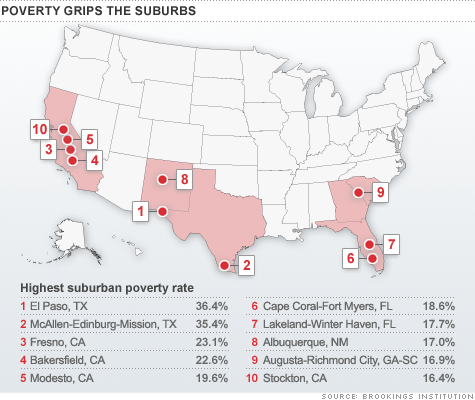 While Congress began another round of government by brinkmanship and self-inflicted wound, I stumbled upon a couple of maps of the United States today that offer a depressing update, not on the nation's highway system, perhaps on the American dream. The Center on Budget and Policy Priorities digs a little deeper into poverty statistics recently released by the Census Bureau with this depcition on the worsening rate of "deep poverty" in the United States, that is, families and individuals who live below one half the poverty line, that's an annual income of $5,570 for an individual and $11,157 for a family of four. The number of people in deep poverty rose to 20.4 million in 2010, up 4 million (25 percent) since 2007.
While Congress began another round of government by brinkmanship and self-inflicted wound, I stumbled upon a couple of maps of the United States today that offer a depressing update, not on the nation's highway system, perhaps on the American dream. The Center on Budget and Policy Priorities digs a little deeper into poverty statistics recently released by the Census Bureau with this depcition on the worsening rate of "deep poverty" in the United States, that is, families and individuals who live below one half the poverty line, that's an annual income of $5,570 for an individual and $11,157 for a family of four. The number of people in deep poverty rose to 20.4 million in 2010, up 4 million (25 percent) since 2007.
Such levels rose in 40 states between 2007 and 2010 and declined in, well, none.
Another map depicts another aspect of growing poverty in America: where it's happening. As low-wage service industry folk followed jobs into the suburbs, the number of people struggling to get by in America settled down in Ward Cleaver land. The number of poor in the burbs bow exceeds the numbers in U.S. urban areas. CNN Money:
 "A record 15.4 million suburban residents lived below the poverty line last year, up 11.5% from the year before, according to a Brookings Institution analysis of Census data released Thursday. That's one-third of the nation's poor.
"A record 15.4 million suburban residents lived below the poverty line last year, up 11.5% from the year before, according to a Brookings Institution analysis of Census data released Thursday. That's one-third of the nation's poor.
"And their ranks are swelling fast, as jobs disappear and incomes decline amid the continued weak economy.
"Since 2000, the number of suburban poor has skyrocketed by 53%, battered by the two recessions that wiped out many manufacturing jobs early on, and low-wage construction and retail positions more recently."
That new locus matters because most social services have as a rule been located where the poor reside, up to now in the cities. States and local communities are going to have to services likewise out to the suburbs as a first step toward adequately addressing the need.








So let's summarize: one-third of the very poor live in the suburbs. Why is this a surprise when more than half of the U.S. population has been living in the suburbs for almost a half century? With a population that large why would you not expect to find a significant part of the nation's poor in the suburbs? Answer: The poverty establishment of the country is completely invested in big cities operationally, politically, culturely and emotiionally as establsihed by the social visions of the 1960s War on Poverty almost a half centrury old ago. Who is poor and where the poor live and the modern causations of poverty have not been updated for quite a long while. Yet the world has changed profoundly sinced the 1960s.
So suburan poor, rural poor and the poor of small and medium size towns and cities are relatively on their own and politically act accordingly by not supporting the soicial initatives that benefits someone else.
This is further evidence why the class warfare appeals are not making sense: people in the same class are treated widely differently due to their political connections and not sound economic policy facused on the economy imporvement not politcal advantage. . Govenment actions such as the recent economic stimulus program favored obtaining poltical results by patronizing political allies rather than even-handedly aiming to have real nationwide impact on the economy. This narrow political cronyism is the same kind of poison that killed off the Soviet Union and its "workers paradise" twenty years ago. Political patronage of narrow demographic groups such as the recent call for class warfare is a corruption of the vitality and health of the entire economy and a diversion from effectively impoveing everyone's economic prospects.